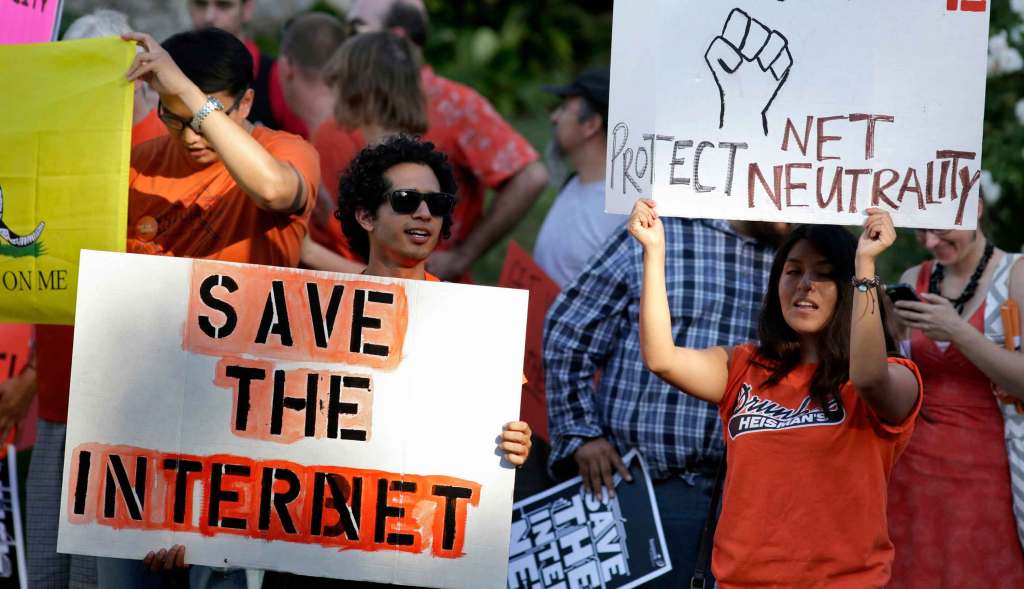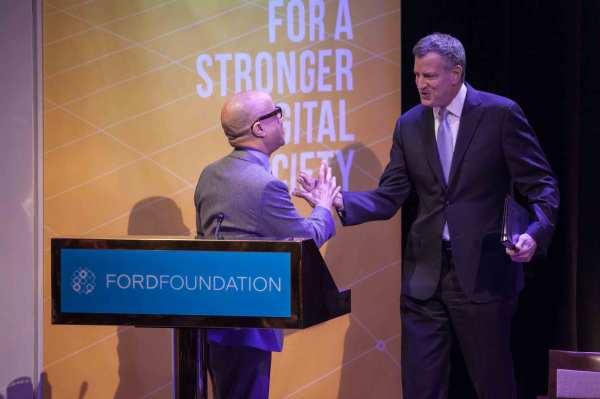
The verdict is in: The Internet is not a luxury. Broadband is an essential public utility, and must be equally accessible to everyone.
Yesterday, the US Court of Appeals for the District of Columbia Circuit ruled decisively to uphold the Federal Communications Commission’s net neutrality rules, which require Internet service providers to treat all web traffic equally—preventing them from blocking or slowing some traffic and offering preferential treatment to sites that pay for faster service. Net neutrality is essential because it maintains the Internet as an open platform for free expression, political engagement, education, and economic opportunity.
As the New York Times explained in an op-ed, “The decision helps to ensure a level playing field for smaller- and start-up Internet businesses because it precludes larger, established companies like Amazon and Netflix from simply paying broadband companies for faster delivery. Equally important, it ensures reliable service and choice for consumers by acknowledging that the internet, now a requisite of modern life, is akin to a utility, subject to regulation in the public interest.”
How did we get here?
In February 2015, the Federal Communications Commission voted to reclassify broadband service under Title II of the Communications Act—affirming that the Internet is an essential public service, and so the rules that govern its provision must treat it as such.
Channeling John Oliver (see video below), I will admit that even I find myself nodding off as I type the sentence “reclassify broadband service under Title II of the Communications Act.” So why should we care about that 2015 FCC vote to do just that, and yesterday’s court decision upholding that vote?
Accessibility Statement
- All videos produced by the Ford Foundation since 2020 include captions and downloadable transcripts. For videos where visuals require additional understanding, we offer audio-described versions.
- We are continuing to make videos produced prior to 2020 accessible.
- Videos from third-party sources (those not produced by the Ford Foundation) may not have captions, accessible transcripts, or audio descriptions.
- To improve accessibility beyond our site, we’ve created a free video accessibility WordPress plug-in.
Even if the terms we use to describe this work—net neutrality, Title II, reclassification—are dry, the real world consequences of an open Internet are profoundly important. The Ford Foundation and the organizations we support, in every field, depend on the existence of an open, democratic communications infrastructure. Explaining the deep connection between Internet rights and civil rights, Ford Foundation president Darren Walker explained, “The Internet is now our central platform for engaging in dialogue about the most important issues facing our country. It’s where we share our views, speak out against injustice, and express our hopes for the future.”
After the FCC’s 2015 vote to enact strong net neutrality rules, cable, telecom, and wireless Internet providers sued to overturn these regulations, arguing that the rules would constrain business. Yesterday, when the Court ruled on behalf of the FCC and net neutrality, it was a major victory for the public against extraordinarily powerful corporate interests.
Advocates explain why net neutrality matters
For more than a decade, the organizations we support have been working tirelessly on what has until recently been a fairly obscure topic, even as the Internet has assumed an increasingly central role in our lives. Responding to yesterday’s victory, Rashad Robinson, executive director of ColorOfChange, emphasized the importance of net neutrality for black communities. “Net neutrality is essential to protecting our free and open Internet, which has been crucial to modern-day civil rights movements and fights for equality,” he said. “Our ability to have our voices heard in this democracy depends on an open Internet because it allows voices and ideas to spread based on substance, rather than financial backing.”
Malkia Cyril, executive director of the Center for Media Justice (who writes so powerfully about digital black power in the 21st century), connected the importance of net neutrality to the tragedy dominating the news. “Those who lost their lives at the Pulse nightclub shooting in Orlando, most of whom were Black and Latino, are 49 of the many reasons we celebrate the court’s decision to keep the Internet open,” she said. “With a truly open Internet, we can hear the voices of those who lost loved ones, organize vigils nationwide to honor their passing, oppose the hateful rhetoric that compromises democracy, and organize to prevent this from ever happening again.”
Michael Scurato, vice president of policy at the National Hispanic Media Coalition, explained why the ruling matters in a broad context. “This decision is a decisive victory for those who rely on the open Internet to express themselves, organize, make a living, participate in policymaking, get a job, earn an education and do all of the critical things that we so often take for granted,” he said. “Hopefully, rather than continuing to fight this losing battle against openness, entrepreneurship and innovation, opponents will now turn to constructive endeavors, like making sure that everyone in this country can access affordable broadband.”
More than a year ago, after the initial FCC vote, Harold Feld, senior vice president at Public Knowledge, described how a powerful communications body came to affirm the importance of an open Internet. It happened, he explained, “because hundreds of lawyers, grassroots organizers, and policy advocates persuaded over 4 million people to stand up for their rights and demand that the government act to protect them from the unrestrained corporate power of broadband access providers. It shows—to everyone’s surprise—that government of the people, by the people and for the people has not perished from this Earth.”
Free Press president Craig Aaron also underscored the importance of grassroots efforts in making sure that judgment was upheld. “The real story here was dozens of public interest groups, new civil rights leaders and netroots organizers coordinating actions online and off, inside and outside Washington,” he said. “Artists, musicians, faith leaders and legal scholars bolstered their efforts. And about a dozen mostly unsung advocates in D.C. pushed back daily against the phone and cable lobby. This diverse coalition broke the FCC’s website, jammed switchboards on Capitol Hill, and forged new alliances that are transforming how telecom and technology policy is made.”
What’s next?
Strong net neutrality rules in the US ensure that we will continue to have access to a free and open Internet—one that will remain an engine of free expression, economic growth, and innovation. With those protections in place, we’re continuing to work with our partners to make the Internet more accessible and affordable—so that everyone can tap into the benefits and extraordinary potential this court decision helps protect.

